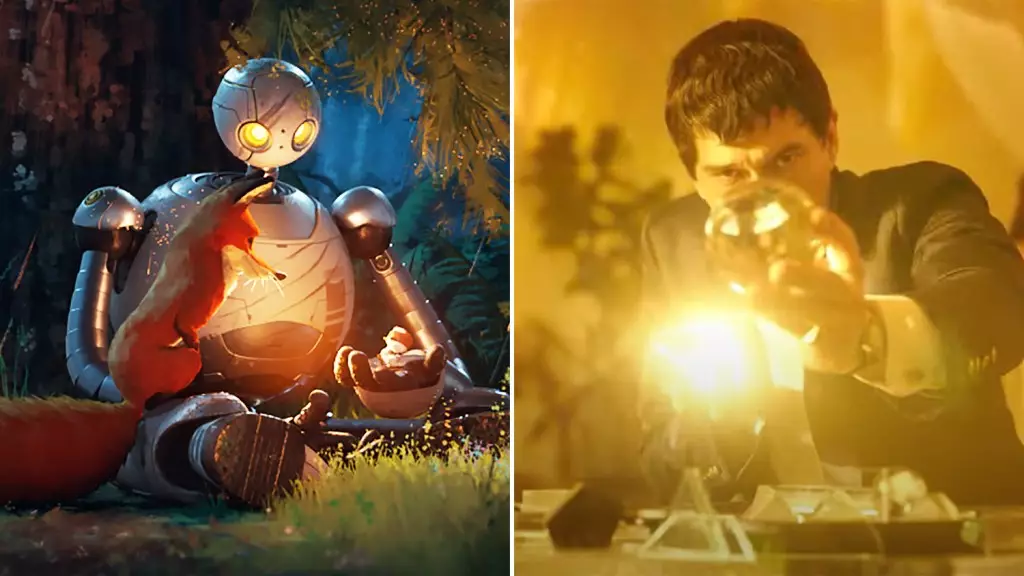DreamWorks Animation, in collaboration with Universal, has made a significant impact with its recent release, *The Wild Robot*, which grossed an impressive $1.95 million during its preview showings, which commenced at 2 PM in approximately 3,000 theaters. Featuring the voice of acclaimed actress Lupita Nyong’o, the film is anticipated to dominate the box office with projections of over $20 million over its opening weekend. This opening figure is quite promising when compared to earlier entries from DreamWorks Animation. Previous films like *Trolls Band Together* and *The Bad Guys* had preview earnings of $1.3 million and $1.15 million, respectively. This context amplifies the excitement surrounding *The Wild Robot*, particularly as it appears to be drawing larger initial audiences than its predecessors.
PostTrak audience ratings have been overwhelmingly positive for *The Wild Robot*, garnering five stars from general viewers, while especially resonating with parents and children—ratings of 4.5 and 5 stars respectively indicate widespread acclaim. Demographic statistics show that the film has captivated a diversified audience, notably featuring a significant number of female viewers among children under 12. These insights into audience reception are crucial for marketing future animations, indicating that strategies should target families and embrace diversity within promotional materials.
In stark contrast, the launch of *Megalopolis*, Francis Ford Coppola’s ambitious project backed by Lionsgate, seems poised for a disappointing debut. Despite its self-financed budget of $120 million, the film has accumulated a mere $770,000 in its previews. Comparisons with previous box office flops, such as Kevin Costner’s *Horizon*, which opened with only $11 million after a comparable preview, underscore the challenges facing *Megalopolis*. With critics providing a disappointing 50% score on Rotten Tomatoes and a poor audience reception of just 45% positive reviews on PostTrak, it’s clear that this film has failed to resonate with moviegoers to the same degree as *The Wild Robot*.
Coppola’s name carries weight, having won five Oscars over his illustrious career. However, as a producer, the prevailing viewing trend challenges the auteur’s traditional methods, revealing a potential disconnect between his vision and audience sensibilities today. While Coppola himself mentioned that the financial implications of *Megalopolis* won’t adversely affect him or his family, the film’s commercial integrity poses serious questions about its viability in an ever-evolving cinematic landscape dominated by blockbuster franchises and animated features that resonate broadly with families.
The reaction to *The Wild Robot* also highlights a broader trend within the film industry—a marked preference for animated features that cater to family demographics. With parents representing 18% of the audience in this film and children making up 10%, the overall appeal of *The Wild Robot* stands in stark contrast to *Megalopolis*, which struggled to attract a significant family audience. The statistics reveal a profound departure from traditional cinematic preferences, hinting at a potential shift towards narratives and characters that foster emotional connections in younger viewers.
In opposition to conventional wisdom, animated films like *The Wild Robot* now demonstrate the ability to garner substantial financial success and audience engagement without requiring the star-studded casts typical of live-action projects. This reality may compel filmmakers to reconsider their production approaches and marketing strategies, prioritizing family-friendly content that can thrive in today’s competitive box office environment.
As *The Wild Robot* takes center stage, established films like *Beetlejuice* and *Transformers One* continue to maintain strong positions at the box office. *Beetlejuice*, now in its third week, has racked up $234 million, showcasing longevity that defies standard release patterns, whereas *Transformers One’s* initial weekend earnings reflect a healthy performance despite anticipatory declines.
On the opposite end, the performance of *Megalopolis* reinforces the intricate dynamics of box office success, demonstrating the potential pitfalls faced by ambitious projects lacking audience enthusiasm. With Lionsgate acting merely as the distributor and Coppola absorbing the financial burden of marketing—a projected cost of $15 million to $17 million—the studio is set to collect a distribution fee regardless of the film’s reception, reflecting a less risky investment for the company.
The contrasting fortunes of *The Wild Robot* and *Megalopolis* are emblematic of a transitional landscape in cinema that prioritizes broad audience engagement over purely artistic ambitions. As studios continue to navigate these waters, the outcome of these films serves as a barometer for understanding both audience preferences and potential future trends in animation versus live-action storytelling. With factors such as demographic shifts and cinematic innovation playing vital roles, filmmakers will undoubtedly have to adapt their strategies to resonate within this evolving cultural framework. The box office performance of upcoming releases will further illuminate how these forces continue to shape the film industry in the years to come.

Leave a Reply